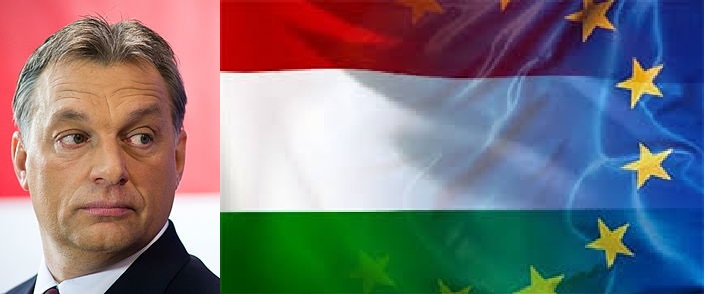Hungary’s Orban likens Brussels to Soviet expansionism
Viktor Orban once again called on Hungary to stand up to Europe's "Sovietization" and defend its borders against mass migration. Orban spoke at a commemoration of a 1956 anti-Communist uprising, where thousands were cheering him.
Published: October 24, 2016, 8:19 am
“Our responsibility is to prevent Brussels from Sovietizing,” said the Hungarian leader. Orban warned against the transformation of the EU into a “modern-day empire” akin to the Soviet Union in the ceremony held on Sunday, the Financial Times reported.
Polish President Andrzej Duda, the guest of honor at the commemoration, assured Hungarians of unwavering support from Warsaw.
“You can count on Poland, we march together in the toughest moments,” Duda told supporters waving Polish flags. “Two countries which were built on Christian foundations and are now free in the unified Europe,” he said.
US officials were conspicuously absent from the commemorations. Andras Simonyi, a former Hungarian ambassador to NATO, told reporter Andrew Byrne in Budapest, that Washington was sending a stark message of displeasure and serious concern “with the state of democracy in Hungary”.
But Orban’s Fidesz party has retained the support of 40 per cent of decided voters since his launched his hardline opposition to the EU’s refugee policies last year.
The popular Hungarian leader cast the conservative government as the inheritors of an unfinished freedom struggle. But leftists are accusing Orban of “hijacking” history according to the Financial Times, saying they are “alarmed” by the country’s “authoritarian” leadership.
Orban, a vocal critic of the European Union’s migrant policy and an early opponent of the recent influx of asylum seekers, said freedom in Europe depended on sovereignty and Christian traditions.
“People who love their freedom must save Brussels from Sovietization, from people who want to tell us who we should live with in our countries,” the prime minister said to loud approval from the crowd.
“We sent the Soviets home and cleared Hungary of the consequences of dictatorship,” Orban said, who spoke outside parliament where the first shots of the 1956 revolution were fired against peaceful demonstrators. “Now we want to remain a European nation and not become an ethnic group in Europe,” he added.
“As heirs to 1956 we cannot allow Europe to cut the roots that made it great and helped us survive the Soviet suppression. There is no free Europe without nation states and thousands of years of wisdom from Christianity,” he said on Sunday.
“We must close the border to stop the mass migration that flows from the south.”
While a small group of protesters tried to derail the speech by whistling as Orban spoke, and brawls broke out in the crowd between his supporters and opponents, according to Reuters, the attempts did not dampen the mood.
“We cannot create freedom while this despicable leftist opposition exists,” said Laszlo Barta, an Orban supporter told Reuters.
Along with other ex-Communist countries in eastern Europe, Hungary opposes a policy that would force all EU members to take in thousands of Muslim migrants.
Orban has led resistance against German Chancellor Angela Merkel, who claims all EU countries have an obligation to share the burden of migrants.
He responded to Merkel’s hugely unpopular dictates last year by sealing Hungary’s southern borders with a razor-wire fence and deploying thousands of soldiers and police to ward off illegal entry.
Politico reported that the streets of Budapest were lined with large billboards portraying young 1956 street fighters carrying arms, in an attempt to draw parallels between Hungary’s struggle against Moscow and the current struggle against the European Union.
The government has spent tens of millions of euros on the event, commissioning songwriter Desmond Child, who has worked with bands like Aerosmith, to write a theme song.
Minister for Human Resources Zoltán Balog, in charge of organizing this year’s celebrations, said Hungary’s youth are the target group, adding that: “Before the risk was lies about 1956, now the risk is disinterest”.
The US state department meanwhile on Thursday issued a written statement expressing concern over “the steady decline of media freedom in Hungary” following the closure of Hungary’s leading opposition newspaper this month, but the paper closed as a result of a dwindling readership.
“The Obama administration and the current state department supports the left — those post-communists who were always on the other side,” said Maria Schmidt, government commissioner for the commemorations and a prominent conservative historian told The Financial Times.
Schmidt accused Washington of an unbalanced perspective. “Why is every post-communist acceptable, but they are so strict against former Nazis?”
Orban has close ties with Moscow, including a multibillion-euro nuclear energy deal that would bolster Hungary’s economic prospects. He was also the first European Union leader to endorse Donald Trump for president of the United States.
All rights reserved. You have permission to quote freely from the articles provided that the source (www.freewestmedia.com) is given. Photos may not be used without our consent.
Consider donating to support our work
Help us to produce more articles like this. FreeWestMedia is depending on donations from our readers to keep going. With your help, we expose the mainstream fake news agenda.
Keep your language polite. Readers from many different countries visit and contribute to Free West Media and we must therefore obey the rules in, for example, Germany. Illegal content will be deleted.
If you have been approved to post comments without preview from FWM, you are responsible for violations of any law. This means that FWM may be forced to cooperate with authorities in a possible crime investigation.
If your comments are subject to preview by FWM, please be patient. We continually review comments but depending on the time of day it can take up to several hours before your comment is reviewed.
We reserve the right to delete comments that are offensive, contain slander or foul language, or are irrelevant to the discussion.






